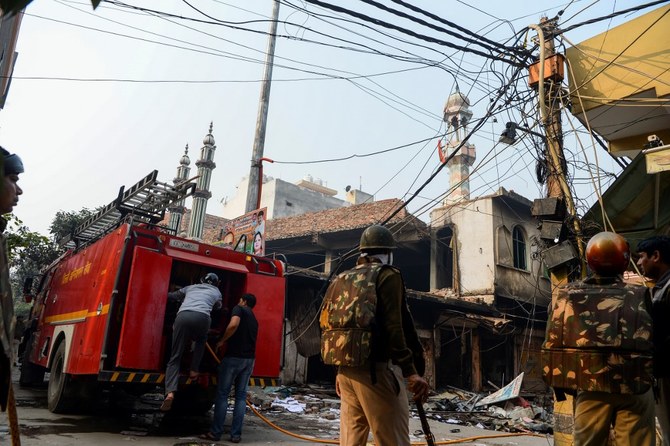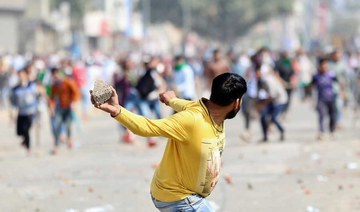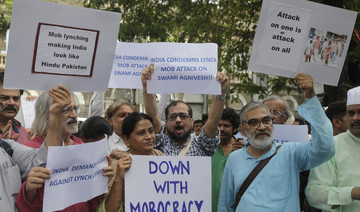NEW DELHI: Indian Prime Minister Narendra Modi called for calm Wednesday after Delhi’s worst sectarian violence in decades left at least 22 people dead and calls for a military curfew.
This week’s battles between Hindus and Muslims have seen mobs armed with swords, guns and acid raze parts of a northeastern district of the Indian capital.
The clashes, which also left almost 200 injured, were triggered by protests against a citizenship law seen by many critics as anti-Muslim and part of Modi’s Hindu nationalist agenda.
They exploded into brutal violence on Monday and Tuesday, with residents forced to flee their homes after seeing dwellings destroyed, a mosque attacked and a tire market and two schools set ablaze.
“I appeal to my sisters and brothers of Delhi to maintain peace and brotherhood at all times. It is important... calm and normalcy is restored at the earliest,” Modi tweeted on Wednesday.
Delhi’s chief minister, Arvind Kejriwal, a political opponent, called for the army to be deployed and for a curfew to be imposed.
“Police, despite all its efforts, (are) unable to control situation and instill confidence,” Kejriwal tweeted.
Sunil Kumar, the director of the hospital where many of the wounded were taken, said on Wednesday that almost 60 had gunshot injuries and that 16 new patients were admitted on Wednesday.
On Wednesday morning residents cleaned out the blackened interior of a trashed mosque, including a charred Qur'an, burned out during the violence in the Ashok Nagar area.
A video circulated on social media and verified by AFP showed men ripping off the muezzin’s loudspeaker on top of the mosque’s minaret and installing a Hindu religious flag.
Locals accused the police of doing nothing to help — or worse.
“We tried to make many calls to the police... that people are entering our neighborhoods chanting ‘Jai Shree Ram’,” said Naeem Malik, referring to a popular Hindu chant.
“But police did not help us at all. We tried to save the women at the protest site but instead policemen started beating us up,” he said, showing wounds on his leg and hands.
Elsewhere a firetruck tried to put out blazes from the previous night, the air thick with smoke from still-smoldering cars, motorbikes, shops and homes.
“They say we are not Indians, but we are Indians by blood,” Farhat, 22, a student in Islamic studies, said in her father’s shop as police looked on.
“There is no police in the streets at night, just during the day.”
The area is home to mostly poorer economic migrants from elsewhere in India living in shanty neighborhoods, and some fled on Wednesday ahead of more expected clashes.
“It is better to leave than to stick around here. Why would we want to die here?” a tailor said as he prepared to return home to his village in northern India.
The unrest comes amid growing concerns at home and abroad about India’s direction and the future of its 200 million Muslims since Modi’s Hindu nationalist BJP swept to a second term last year.
Meanwhile, the US Embassy in New Delhi urged its citizens on Wednesday to be cautious in light of violent demonstrations and avoid all areas with protests.
“It is important that you monitor local media outlets for updates on demonstrations, road and Metro closures, and possible curfews,” it said in a statement, adding that “the government of India-imposed law that prohibits political gatherings of four or more people – known as Section 144 – remains in effect in certain areas.”
It called on its citizens to avoid locations that are expected to have heavy traffic, road closures or protests, keep a low profile and follow the instructions of local authorities.
Sonia Gandhi, president of the opposition Congress party, on Wednesday accused BJP figures of giving “inflammatory speeches spreading an atmosphere of hatred and fear,” including in Delhi city elections this month.
Congress “appeals to the people to reject the politics of hate,” Gandhi said, calling Home Minister Amit Shah, Modi’s close ally, “responsible” for the riots.
Since winning a second term, Modi’s government has revoked the partial autonomy of Kashmir, India’s only Muslim-majority state, and said it wants to conduct a nationwide citizens’ register to weed out “infiltrators.”
Together with the citizenship law, which fast-tracks claims for persecuted non-Muslim religious immigrants, this has stoked fears that Modi’s master plan is to remold India as a Hindu nation, something he denies.
Modi, 69, was accused of doing nothing to stop religious riots in 2002 when he was chief minister of Gujarat when around 1,000 people died, mostly Muslims.
The citizenship law has sparked months of nationwide protests as well as clashes that killed more than 25 people in December.




























